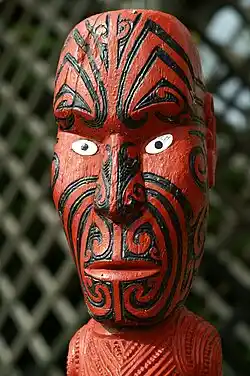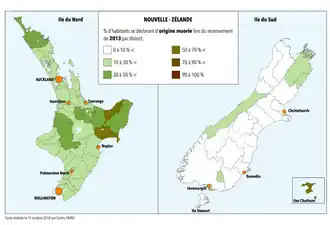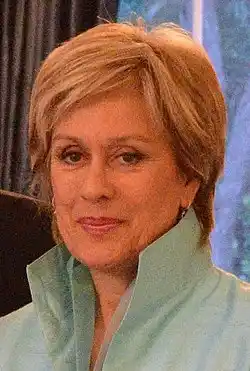Māori surnames, also known as whakapapa or whānau, are essential to the identity of the indigenous people of New Zealand. They connect modern Māori and anyone with Māori heritage and individuals to their ancestors, tribes, and cultural heritage. They also reflect the cultural evolution in New Zealand over the last 250 years.
History and conventions of Māori surnamesHistory and conventions of Māori surnames
Māori surnames have evolved over time, blending traditional customs with growing European influences. Before the 1800s Māori children were given one or more names based on significant events around their birth. These names were often descriptive or related to notable events in their lives or those of their families. As individuals grew up they might receive new names based on their life experience. This naming system did not conform to the European system of surnames[1].

With the arrival of Europeans in the 19th century, adding surnames to Māori names become more common. Various surname conventions emerged[2]:
- A Māori might take their father's first or given name as their own surname. As an example, if a father's name was Ariki, the surname of their offspring might be Maunga Ariki (literally "Chief of the Mountain").
- In other cases, Pākehā names (names of people of non-Māori, usually European, descent) were directly translated into the Māori language. Thus, a Pākehā name such as John River could become John Te Awa.
- Over time as formal documents such as birth, death and marriage certificates were legally required in New Zealand, Māori had no option but to adopt Western-style surnames. Many Māori then chose surnames reflective of their ancestry or had personal significance to them.
- Other Māori simply adopted Pākehā names outright. This sometimes involved the transliteration of biblical names as Māori converted to Christianity.
How Māori surnames are useful for the family historianHow Māori surnames are useful for the family historian

Understanding variations or patterns in Māori surnames these can provide helpful clues when tracing possible Māori ancestry [3]:
- Surnames can help you track key features of Māori society and cultural practices as the iwi (tribe), hapū (sub-tribe), marae (meeting grounds associated with a particular iwi), whānau (extended family group, encompassing several generations) and tīpuna (ancestors).
- Locations where a person, or their tīpuna, were born, grew up, lived, or worked can help explain their whakapapa. Similarly, a Māori whakapapa can offer clues to their geographic origin.
- Because birth, marriage, and death dates provide a timeline that spans generations they can play a very useful role in accurately identifying a particular individual. This is especially when dealing with common Māori surnames.
- The surname can help you identify different Māori generations and Māori family relationships. Two people with the same Māori surname born 60 years apart very likely are from different generations. Meanwhile two people with the same Māori surname before marriage each other suggests they were already biologically related.
- Christianity was traditionally important in the life of some Māori. Understanding the religious affiliations of a particular whānau can lead to potential new sources of information such as church records.
Māori surnames of toponymic originMāori surnames of toponymic origin
There are Māori names that reference ancestral lands or geographic landmarks, often reflecting tribal territory or rohe; while these have not always been used as surnames, they often appear in legal, tribal, and genealogical contexts as surname substitutes.
- Ngāti Porou – from the iwi (tribe) on the East Coast
- Te Arawa – a major confederation of Rotorua iwi
- Waikato – from the Waikato region and river
- Ngāpuhi – the largest iwi, in the north
- Raukawa – central North Island iwi
- Te Rarawa – Northland iwi
- Ngāti Ruanui – Taranaki iwi
- Ngāti Kahungunu – East Coast iwi
- Ngāti Maniapoto – King Country region
- Tainui – ancestral waka and iwi confederation
Māori surnames of patronymic originMāori surnames of patronymic origin
A number of Māori surnames are derived from important ancestors’ given names, in a similar way of the "son of" structure used in European surnames.
- Hōne – from Hōne Heke, a prominent chief
- Te Kooti – from Te Kooti Arikirangi Te Turuki, a prophet and rebel leader
- Pōmare – from a chiefly lineage, also adopted from Tahiti
- Tūwharetoa – ancestral name of a major iwi
- Tāwhiao – the second Māori King
- Wharepapa – possibly derived from a named ancestor
- Tītokowaru – Ngāti Ruanui leader
- Kawiti – named for warrior chief Te Ruki Kawiti
- Wī Repa – transliteration of “William Reaper,” used in multiple hapū
- Rangihuna – combining rangi (sky) and huna (hidden), possibly ancestral
Māori surnames of occupational originMāori surnames of occupational origin
Māori society is very traditional and has a number of specific roles; some of these began to be used as surnames related to social duties or tribal functions, like the following:
- Tohunga – “priest” or “expert,” sometimes symbolic surname
- Kaumatua – “elder,” generally a title, but may appear as a name
- Whaea – “mother/aunt,” sometimes used as part of name lines
- Kaiwhakahaere – “leader/organizer,” more modern
- Rangatira – “chief,” appears in composite names
- Kaiako – “teacher,” occasionally used in contemporary surnames
- Kaitito – “composer,” often of haka or waiata
- Taua – “war party,” symbolic of a warrior background
Māori surnames of descriptive originMāori surnames of descriptive origin
Some Māori surnames may derive from words reflecting personality, appearance, natural symbols, or events, like the following:
- Rangimarie – “peaceful skies,” often used as given or family name
- Te Aho – “the thread” (symbolic of ancestry)
- Whakarongo – “to listen”
- Te Awa – “the river”
- Whaitiri – “thunder,” name of a mythic ancestress
- Rongo – peace deity and symbol of cultivation
- Mahuta – “to rise,” also a Kingitanga name
- Pounamu – “greenstone,” sacred and symbolic
- Moana – “ocean”
- Whenua – “land” (symbolic of origin and identity)
Māori surnames of occupational originMāori surnames of occupational origin
With European colonization, some surnames were either adopted by Māori people from English given names, under missionary influence, or even intermarriage with Europeans or other Pacific peoples. A few examples are included below:
- Wiremu – transliteration of “William”
- Pere – transliteration of “Bell” or “Perry”
- Hakaraia – from “Zachariah”
- Tāne-Pitama – blended Māori-English surname
- Tamihana – from “Thompson”
- Makarini – from “McLean” or “MacLaren”
- Hēmi – from “James”
- Rāpata – from “Robert”
- Rāniera – from “Daniel”
- Tāmati – from “Thomas”
Māori surnames of aristocratic originMāori surnames of aristocratic origin
These names are related to hereditary leadership (Rangatira), the Kingitanga movement, or major tribal houses:
- Pōtatau – from Pōtatau Te Wherowhero, first Māori King
- Mahuta – the third Māori King
- Te Heuheu – powerful Ngāti Tūwharetoa chief lineage
- Te Puea – from Te Puea Hērangi, key royal figure
- Tūkino – dynastic name within Ngāti Tūwharetoa
- Waaka – transliteration of “Walker,” became a chiefly name
- Te Whiti – from Te Whiti o Rongomai, prophet and leader of Parihaka
- Ngāpō – respected Waikato lineage
- Rāpihana – transliteration of Robinson, often associated with mana whenua
- Heke – as in Hōne Heke Ngāpua, significant political leader
Some common (and not so common) Māori surnamesSome common (and not so common) Māori surnames
There are various online specialist websites that provide list of common Māori surnames[4]. Among these are Te Hira (nobility and honour); Rangi (sky or heavens); Ngaio (connected to local Ngaio tree, it suggests strength and resilience); Ngata (associated with notable Māori leader Sir Apirana Ngata; and Tāne (a god of forests and birds in Māori mythology).
Some European surnames, such as Smith, Williams, Jones, Brown and Davis, are also widely observed among the Māori.
Some unusual Māori surnames[5] you might come across include Rewiti (to bind or secure); Tawhiri (associated with the god of weather); Whakatane (referencing a legendary Māori woman); Aoraki (named after the tallest mountain in New Zealand); Kaihau (speed); and Tūwhare (to listen or pay attention).
Celebrities with Māori surnamesCelebrities with Māori surnames

Historical and well-known people with Māori surnames include[6]:
- Sir Apirana Ngata: prominent New Zealand statesman, Māori leader, and politician.
- Te Rauparaha: chief and war leader for the Ngāti Toa tribe who played a significant role in shaping New Zealand's political and cultural landscape during the early 19th century.
- Dame Whina Cooper: inspirational leader and activist who played a crucial role in land rights and Māori sovereignty movements.
- Taika Waititi: internationally recognised filmmaker, actor, and comedian.
- Dame Kiri Te Kanawa: world famous opera singer
- Witi Ihimaera: his novel "The Whale Rider" gained global recognition and has been adapted into a successful film.
See alsoSee also
Explore more about Māori surnamesExplore more about Māori surnames
The Wiki article, New Zealand provides a general introduction to New Zealand. Meanwhile the article New Zealand genealogy offers helpful background on New Zealand history and cultural development from the perspective of the family genealogist.
There are several other MyHeritage resources you can use to assist your research into Māori surnames.
- Genealogy Research for Beginners: How to Get Started is a great place to start for anyone new to family history research.
- How Does DNA Matching Work? will help make use of this powerful tool. Use it in conjunction with Ngā aho tāne o Te Moana-nui-a-Kiwa: Revitalising connections across the Pacific with Big Y, to help you untangle connections between atDNA matches and trace male ancestral lines from New Zealand to the wider Pacific and beyond.
- Other relevant Legacy FamilyTree Webinars include Researching Your New Zealand Ancestors and Finding Families in New Zealand.
Other online resources specific to Māori surname research include:
- National Library of New Zealand offers a detailed guide directs you to whakapapa resources available online from the Library and elsewhere, including the Alexander Turnbull Library.
- Exploregenealogy.co.uk, a general-purpose genealogical research site has a very useful introduction as well as appropriate links to help you to take advantage the Māori records that are available, both online and at various physical locations.
- FamilySearch, an offshoot of the Mormon Church has a great introduction, Beginning Māori Research, which will help you shift through the various relevant online resources.
References
- ↑ Maori Naming Conventions
- ↑ Discover the rich traditions of Maori family names. Hello Kids Fun. (2024, January 1)
- ↑ Family history resources. Archives.govt.nz. (n.d.).
- ↑ Index of Māori names. Index of Māori Names | University of Waikato. (n.d.).
- ↑ 852+ maori last names: Unraveling the Rich Cultural Legacy. BurbanMumz.Com- Positive Parenting for Modern Mothers.
- ↑ 15 most famous Maori people. Discover Walks Blog. (2023, February 15).

